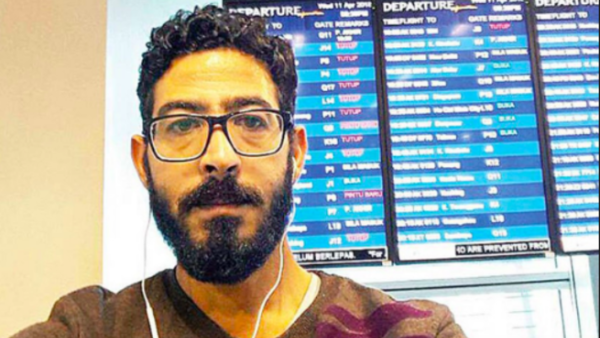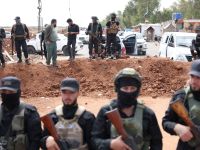By Eleanor Beevor
On Tuesday, it was announced that Hassan al-Kontar, a 37-year-old Syrian refugee, had been arrested in Kuala Lumpur International Airport, where he had been stuck for the past four months. Al Kontar’s story was widely covered in the international media, and he had thousands of followers on Twitter, where he uploaded photographs and reflections of his life in the airport. As Al Kontar told many media outlets, including Al Bawaba, all he wanted was a place to call home where he wouldn’t be forced to fight and kill.
Al Kontar lived an ordinary life up until the Syrian civil war began. He is from Sweida city in Syria, and had been working in insurance marketing in Dubai. However, when the war broke out in 2011, the Assad regime in Syria demanded that he return home, where he would be forcibly conscripted for military service. Al Kontar refused. He told Al Bawaba in June:
“I refused because it is against my principle. War is not a solution, it is not an answer. I refuse to be part of a killing machine. I refuse to kill my brothers or destroy homes. There is no enemy – both are my brothers.”
However, his passport expired in 2012, and because he was wanted for evading conscription in Syria, the Syrian Embassy in the UAE refused to renew it. Al Kontar lost his job shortly afterwards as his company was unable to renew his visa, and he had to live illegally in the UAE for five years.
In 2017, he was caught by immigration authorities, and they deported him to Malaysia, one of the few countries that Syrians can enter without a visa for up to 90 days. From there he tried to travel to Ecuador to claim asylum, and to Cambodia when that also failed. Both times he was refused entry.
He was deported back to Kuala Lumpur Airport, but was unable to enter the country, and could only stay in the airport. Low on money and out of options to travel, Al Kontar’s last hope was the efforts of a Canadian volunteer group. Canada Caring hired Al Kontar a Canadian lawyer to try and get him asylum in their country. His visa application is still pending. But despite a petition with over 50,000 signatures to Canada’s Minister of Immigration, Al Kontar’s visa application was not expedited.
That was until this week, when he was arrested for being in a restricted area of Kuala Lumpur Airport, the same area he had been making social media posts and interviews from for four months. He was taken to a detention facility, and his deportation back to Syria is reportedly being prepared.
If he is deported, he is in great danger. Phil Robertson, the Deputy Asia Director for Human Rights Watch, told Al Bawaba:
“Malaysia should take no steps to force Hassan al Kontar back to Syria, where he would face certain political persecution and physical abuse by authorities who have been monitoring his negative comments against the government on social media. Hassan is a person of concern to the UN refugee agency and should be protected not sent back into harm’s way.
The Malaysian government needs to resolve this situation in line with both humanitarian and human rights principles. Senior Malaysian government officials need to intervene now, and tell their Immigration service to stand down, let Hassan out of detention, and permit him to seek assistance from UNHCR. Malaysia has just remanded him for 14 days on an immigration offense, so hopefully there is time to work out a solution that doesn’t involve Hassan being sent back to Syria.”
Al Kontar’s life in the airport involved eating occasional airline meals donated by staff, and struggling to sleep because of the constant light and noise from the announcement system – which he described as akin to torture – and trying to survive the boredom and loneliness. The fact that he was prepared to endure that goes to show how much he dreads the prospect of returning to Syria. And like so many other Syrian men, it’s because he would face forced military service.

A Syrian man carries a child as they evacuate an area following a reported airstrike on April 22, 2016 in Syria’s second city Aleppo. (AFP)
Fear of conscription into Bashar al-Assad’s army is a critical factor preventing Syrian men between the ages of 18 and 42 from returning home. Assad’s army has lost tens of thousands to defection, and to the deadly battles of the Syrian civil war.
Whist typically, men would have to serve two years of military service after turning 18, all Syrian men of age can be called up as reserves in times of war. Assad is so desperate for soldiers that now men of conscription age have been banned from leaving the country unless they have permission from the conscription office. Passport renewal will also only be subject to approval from the Ministry of Conscription.
The hatred that many Syrians feel for Assad, and the exhaustion from seven years of war has compounded the Syrian army’s shortages. But as Hassan Al Kontar said, no one wants to be forced to kill their countrymen. They do not want to endanger their lives fighting battles they don’t believe in, on behalf of a government that has committed crimes against humanity. Even some of Assad’s nominal supporters have sent their sons out of the country to evade military service, a testament to the dangers of conscription.
Al-Kontar himself faces a further risk – being from the persecuted Druze minority, he will be under extra scrutiny. Assad has already issued a warning to the Druze to stop evading conscription. Al Kontar’s identity will put him in even greater peril.
Those men who are deported back to Syria against their will are going to be forced to take part in a war that has been characterised by war crimes and crimes against humanity. It would be shameful indeed if he were deported under these circumstances.







